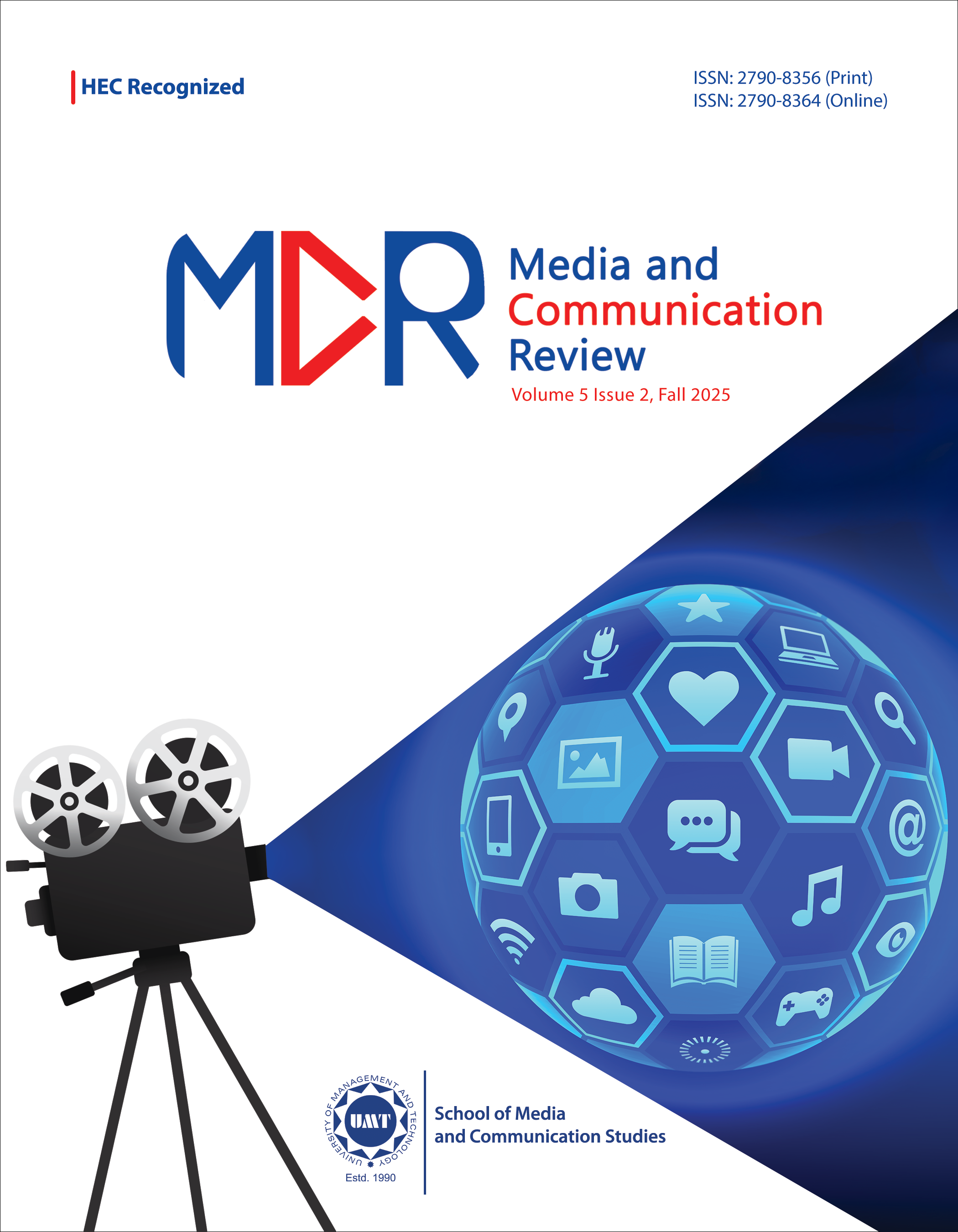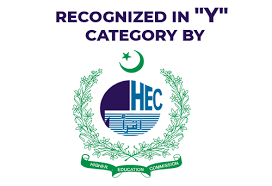Understanding Voter Motivations and Campaign Priorities for the 2024 Elections in Pakistan
Abstract
 Abstract Views: 0
Abstract Views: 0
The year 2024 marked a crucial moment for democracy, with over 70 nations holding national elections, accounting for more than half of the global populace. This historic election year included nearly two billion eligible voters. This study examines voter behaviour and campaign priorities during the general elections in Pakistan in 2024. It emphasises key factors affecting voter behaviour, such as political instability, economic pressures, and evolving media consumption habits. Additionally, it evaluates the influence of media, particularly digital and social platforms, on the wider socio-political landscape impacting electoral outcomes. The research used a quantitative approach, employing a structured questionnaire distributed through Google Forms in January 2024, one month before the elections in Pakistan scheduled for February 8, 2024. The survey gathered feedback from a total of (n=245) individuals. The questionnaire comprised various sections addressing all critical components of voter behaviours and electoral engagement, incorporating both open-ended and closed-ended questions. After data collection, descriptive statistical methods were used to identify significant trends and patterns. The Study concluded that social media is increasingly a key source of political information and campaign engagement. Platforms like Facebook, TikTok, and YouTube have become major forums for political discourse, especially among younger voters. However, traditional campaign strategies, such as public rallies, grassroots efforts, and the influence of family and community, remain significant, particularly in rural areas. The study underscores crucial voter motivations, such as a strong desire for governmental change, concerns about economic uncertainty, and a preference for candidate integrity over party loyalty. Voters prioritise economic improvement and job creation, education reform, social welfare initiatives, and healthcare advancements. Additionally, trust in the electoral process is critical, with transparency, political interference, and institutional credibility influencing voter participation. This research provides important insights for policymakers, electoral bodies, and political strategists by analysing youth engagement, media effects, and policy priorities. It advocates for strengthening democratic engagement through increased electoral transparency, digital literacy initiatives, and inclusive political campaigns. These findings contribute to the broader discourse on voter behaviour in developing democracies and suggest directions for future electoral reforms in Pakistan.
Downloads
References
Ahmad, A., Bhatti, M. I., & Yousaf, F. N. (2020). Whom to vote? Socio-psychological factors influencing voting behavior in rural Punjab, Pakistan. Journal of Social Issues, 3(2), 9–15. https://doi.org/10.36902/sjesr-vol3-iss2-2020(9-15)
Akram, T., Ullah, R., & Wahid, F. (2021). A content analysis of current affairs talk shows on Pakistani news channels. Global Media and Social Sciences Research Journal, 2(2), 14–24.
Asian Network for Free Elections. (2024, February 15). 2024 Pakistani general election: FAFEN analysis of voter turnout. https://anfrel.org/2024-pakistani-general-election-fafen-analysis-of-voter-turnout/
Arshad, R. (2024). The crisis of democracy in Pakistan – The general elections of February 2024. International Journal of Scientific Engineering and Science, 8(4), 6–14.
Bélanger, É., & Meguid, B. M. (2005). Issue salience, issue ownership and issue-based vote choice: Evidence from Canada. Electoral Studies, 27(3), 477–491. https://doi.org/10.1016/j.electstud.2008.01.001
Chughtai, A. (2024, February 5). Pakistan election 2024: By the numbers. Al Jazeera. https://www.aljazeera.com/news/2024/2/5/pakistan-elections-2024-by-the-numbers
Gibson, R. K., & McAllister, I. (2015). Normalising or equalising party competition? Assessing the impact of the web on election campaigning. Political Studies, 63(3), 529–547. https://doi.org/10.1111/1467-9248.12107
Green, D. P., & Gerber, A. S. (2019). Get out the vote: How to increase voter turnout. Brookings Institution Press.
Hussain, Z., Mujahid, F., & Anwar, U. (2022). Climate change in Pakistan: Impacts, strategies, and the way forward. Pakistan Languages and Humanities Review, 6(1), 181–192. https://doi.org/10.47205/plhr.2022(6-I)16
Inglehart, R. (1997). Modernization, postmodernization and changing perceptions of risk. International Review of Sociology, 7(3), 449–459. https://doi.org/10.1080/03906701.1997.9971250
Inglehart, R., & Baker, W. E. (2000). Modernization, cultural change, and the persistence of traditional values. American Sociological Review, 65(1), 19–51. https://doi.org/10.1177/000312240006500103
Khan, N. F., Zahra, A., & Khan, J. (2024). The stability of Pakistan economy and IMF deals: An analysis. Pakistan Social Sciences Review, 8(1), 319–332. https://doi.org/10.35484/pssr.2024(8-I)29
Nordin, A. H., & Smith, G. M. (2018). Friendship and the new politics: Beyond community. Global Discourse, 8(4), 615–632. https://doi.org/10.1080/23269995.2018.1505348
Norris, P. (2017). Transparency in electoral governance. In P. Norris & A. Nai (Eds.), Election watchdogs: Transparency, accountability and integrity (pp. 4–29). Oxford University Press.
O’Neill, A. (2025, January 22). Global elections in 2024 – Statistics & facts. Statista. https://www.statista.com/topics/12221/global-elections-in-2024/
Ostrander, J., Kindler, T., & Bryan, J. (2021). Using the civic voluntarism model to compare the political participation of US and Swiss social workers. Journal of Policy Practice and Research, 2(1), 4–19. https://doi.org/10.1007/s42972-020-00020-z
PromiAD. (2024, March 8). Social media in Pakistan is evolving – 2024 trends. https://promiad.com/social-media-in-pakistan-is-evolving/
Rafique, S., Khan, M. H., & Bilal, H. (2022). A critical analysis of pop culture and media. Global Regional Review, 7(1), 173–184. http://dx.doi.org/10.31703/grr.2022(VII-I).17
Rasheed, M., Imran, S., & Ullah, R. (2024). A critical discourse analysis of the discursive strategies employed in the United States presidential debates of 2016. Al-Mahdi Research Journal, 5(4), 525–536.
Riasat, I., Hussain, M. H. A. G., & Rasheed, A. (2025). Disinformation and political polarization: A qualitative study on the role of social media to develop political biases in Pakistan. Journal of Development and Social Sciences, 6(1), 136–148. https://doi.org/10.47205/jdss.2025(6-I)13
Suleman, S., & Husnain, M. (2025). Youth political awareness in Pakistan: Analyzing the influence of social media platforms. Journal of Applied Linguistics and TESOL, 8(1), 1010–1022.
Saleem, M., Hayat, W., & Akbar, M. J. (2024). Role of social media in shaping voting patterns: A comparative study of 2018 and 2024 general elections in Pakistan. Annals of Human and Social Sciences, 5(2), 182–193. https://doi.org/10.35484/ahss.2024(5-II-S)18
Shah, S. F. A., Cvetkovic, I., Ginossar, T., Ullah, R., Baber, D., & Slaughter, A. (2024). Online harassment, psychological stressors, and occupational dysfunction among journalists working in a conflict zone. Digital Journalism, 12, 735–752. https://doi.org/10.1080/21670811.2024.2308582
Svensson, A. (2025). Youth and democracy: Comparing generations’ attitudes toward democracy in African post-conflict contexts: Examining post-conflict generational differences in democratic attitudes. Diva Portal. http://www.diva-portal.org/smash/record.jsf?pid=diva2:1928959
Torcal, M., & Christmann, P. (2021). Responsiveness, performance and corruption: Reasons for the decline of political trust. Frontiers in Political Science, 3, Article e676672. https://doi.org/10.3389/fpos.2021.676672
Ullah, R. (2025). Countering extremism through the airwaves: The role of FM radio in peacebuilding in Pakistan’s conflict zones. UW Journal of Social Sciences, 8(1), 1–16.
Ullah, R., & Iqbal, A. (2025). TikTok’s consumption among Pakistani youth: A uses and gratifications theory approach. The Journal of Humanities & Social Sciences, 33(1), 1–19.
Ullah, R., Khan, F. A., & Wahid, F. (2025). Generation Z and the prospects of peace: Youth perceptions from conflict affected areas of Pakistan. Forman Journal of Social Sciences, 5(1), 1–21.
Ullah, W., Ali, M., & Khan, U. (2024). An analysis of the vote no-confidence against Imran Khan. Pakistan Journal of International Affairs, 7(3), 130–137. https://doi.org/10.52337/pjia.v7i3.1122
United Nations Development Programme. (2024, March 14). UNDP’s 2023–2024 human development report points to a global ‘gridlock’ of increased inequality and political polarization. https://www.undp.org/pakistan/press-releases/undps-2023-2024-human-development-report-points-global-gridlock-increased-inequality-and-political-polarization
Veil, S. R. (2008). Civic responsibility in a risk democracy. Public Relations Review, 34(4), 387–391.
Verba, S., Schlozman, K. L., & Brady, H. E. (1995). Voice and equality: Civic voluntarism in American politics. Harvard University Press.
Zaheer, B., Bukhtiar, A., Saleem, H. A. R., & Ahmad, H. (2025). Parliament, parties, polls and Islam: Issues in the current debate on religion and politics in Pakistan. Indus Journal of Social Sciences, 3(1), 291–313. https://doi.org/10.59075/ijss.v3i1.636
Copyright (c) 2025 Rahman Ullah, Sana Ullah

This work is licensed under a Creative Commons Attribution 4.0 International License.




